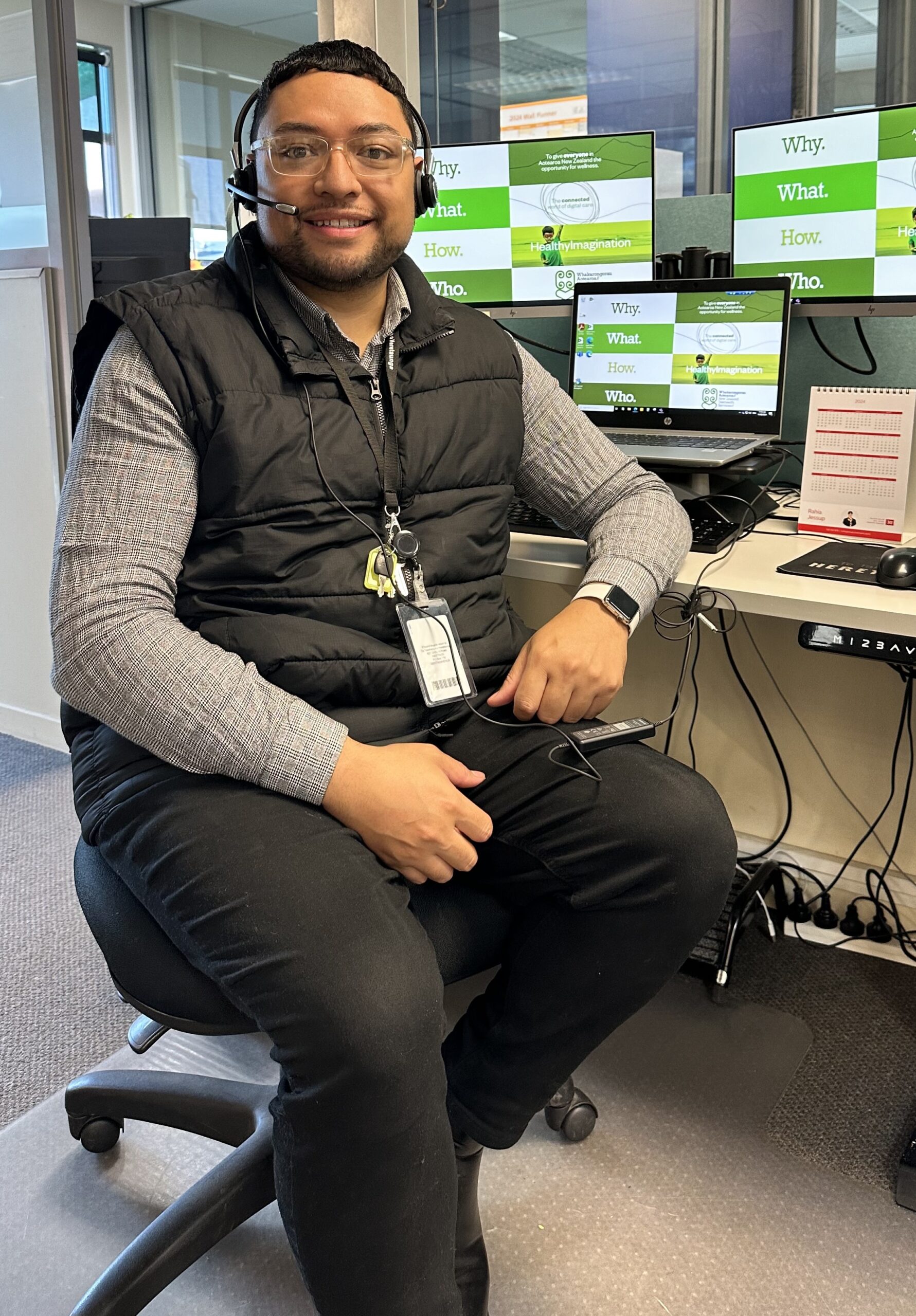 After working internationally in travel and tourism for a decade, Josphes Sipaia’s career switch into telehealth was prompted by the pandemic, and he is now the people leader and call centre manager for Te Taiwhenua o Heretaunga.
After working internationally in travel and tourism for a decade, Josphes Sipaia’s career switch into telehealth was prompted by the pandemic, and he is now the people leader and call centre manager for Te Taiwhenua o Heretaunga.
“I was an international flight attendant and I also worked on cruise ships, so it’s weird to say that at 32 years old, this is the longest land-based job I’ve had. It’s definitely been an experience, discovering that side of life and working 9-5 in an office – but I’m loving it.”
Based in Hastings, the Ministry of Health organisation works with whānau to achieve their goals and general wellbeing, alongside other partner call centres (mostly iwi) for Nga Puhi, Rotorua, and Auckland. Despite having no call centre experience, Josphes quickly worked his way from an advisor to supervisor, head trainer, and now manager.
“We all know what happened in 2020, so thankfully I was able to get back home to Hawkes Bay, before even our domestic borders started closing off. There weren’t many opportunities around during the lockdown period and when I saw this role come up, I thought,‘I’ll give it a shot’ – there’s no harm in trying, right?”
At the beginning of Josphes’ call centre journey, he felt the training modules and learning techniques were a relatively one-sided way of teaching. “Looking around at the dynamics of the people I was working alongside, some hadn’t worked for years, and many came from factory and packhouse backgrounds,” he says.
“Out of 70 of us, none of us had a qualification for call centre work and most had never worked in a corporate or office environment, so there were many different learning styles that weren’t being catered to.”
He noticed some of his colleagues needed a bit more time to learn, particularly those who started during the pandemic when it was extra busy. “It was like, get on the phones, do this, do that, follow this – but due to the time crunch and how rushed and rampant it was, some of them struggled a bit and I think it was natural for me to step in and offer more assistance even though I was also an advisor at the time.
“I was just explaining things in a way that was easier to understand, you know, different learning techniques – some were visual, some were more readers, others were ‘I’ll watch you do it first then can I have a go.’”
Management noticed Josphes’ potential, helping some staff members go from wanting to quit on their first day or who were too scared to get on the phones, to becoming strong advisors, and repeating that cycle of helping others. “That’s when I became a trainer.”
Josphes is the oldest of seven children and his parents are his biggest role models. The Sipaia family moved to New Zealand from Samoa when Josphes was a child. Growing up, he helped look after his younger siblings while their parents worked two jobs day and night. From age 14, he also began working alongside his parents, after school. “I would step in to help my family put food on the table, but I wouldn’t change that for the world because it’s made me into the person I am today.”
His colleagues also provide a source of inspiration, he says. “Just seeing their growth and progress, from being advisors with no confidence, to then becoming supervisors themselves, to becoming trainers. I’m so proud to see a lot of my kaimahi have gone on to work for different call centres across the country – and some have even gone off to study at university in Hawaii.”
It’s incredible what an opportunity can do, he says, not just for the individual but their families. “Opportunity is not always scary. It may be daunting at first but when people push past that and are coached and mentored throughout the processes – seeing them in the actual position – it’s so powerful.
“And you never know who you’re going to inspire, such as family members or our next generation, who then also go on to excel and break the stereotypes out there. Embrace the power and potential that you hold within yourself, and don’t let fear stop you before you’ve even started.”
While Josphes has completed the Contact Centre Level 3 qualification through Skills New Zealand, along with most of his team, he believes upskilling on the job is a great way to learn.
Te Taiwhenua o Heretaunga is one of the largest Māori Hauora providers in New Zealand and culture is at the heart of the organisation – from implementing daily opening and closing Karakia, waiata practice and incorporating Te Reo Māori into their korero.
“Some people might think it’s not a big deal to use greetings on the phone like kia ora, ka kite, or mā te wā, but I believe it’s so important, especially for some of our older Māori kaimahi.”
Josphes would love to see more Māori and Pacific people’s representation in the call centre industry, where connection and whakawhanaungatanga is essential. “We have a lot to offer our communities, and you never know what people are going through, so even just to hear the word kia ora or a warm pacific greeting, could change someone’s day.”